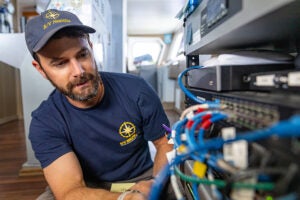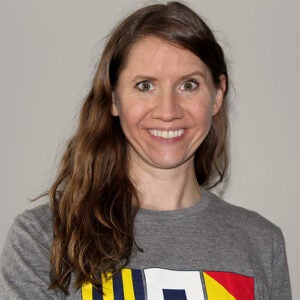By Alexander Castro
“Surfing the web” may seem like a quaint phrase in 2023, but in the premillennial era, it spoke to a vastness shared between the oceanic and the online. Back then it was thrilling that the internet couldn’t be exhausted. Today that prospect is more exhausting than exhilarating.
Thanks to GSO’s newest program offering, however, a talented group of aspiring oceanographers is finding renewed purpose and excitement going online. The online Master of Oceanography (M.O.) degree program started two years ago, and the first cohort numbers about a dozen. They’ll soon graduate without having stepped on the GSO campus for a single class, as this M.O. program is totally virtual.
One student, Julian Race, has even been learning about the sea while sailing it: “I’m generally out on research vessels,” the IT specialist explains. For a decade now he’s been helping to “keep the science moving” in his day job, working on vessels like the E/V Nautilus as a data engineer.
Now Race is also working to complete the 30 credits required for the online M.O. He’s taken several classes at sea, even while working with the United States Antarctic Program in especially chilly waters.
This M.O. includes content from the ‘core’ disciplines of oceanography: biology, chemistry, geology and physical oceanography. Students take at least three of these fundamental classes and an additional five electives, which range from seafloor mapping and scientific writing to ocean resilience and MATLAB modeling. The program is divided into intensive, seven-week sessions.
“[It’s the] first fully online Masters of Oceanography program,” says Arthur Spivack, the program’s coordinator and a Professor of Oceanography. “GSO’s core mission is graduate education through research…This is a way for the knowledge that we generate to more easily get outside of the ivory tower.”
He oversaw the online M.O.’s creation with a committee of faculty members as well as the folks at URI Online, who helped refine the virtual pedagogy. (Spivack also thanks GSO professor Martha McConnell for her crucial help.)
“Everyone comes in highly motivated; We’re just helping them pursue their interests and achieve their goals.”Arthur Spivack, Professor of Oceanography, GSO
For Spivack, it’s been “one of the most academically satisfying experiences” in his career: “Everyone comes in highly motivated; We’re just helping them pursue their interests and achieve their goals.”
The cohort has many interests indeed, and its “curiosity-driven knowledge seekers,” Spivack notes, include “computer scientists, environmental scientists, a medical doctor, lawyers… and CEOs.”
It’d be a nightmare lining up schedules as varied as that, so the program is asynchronous. Students have work to complete each week, but they can do so at their own pace.
That flexibility was paramount for Gabriela Espino, who is currently active military and working “12-hour shifts” at the headquarters of the Pacific Fleet in Pearl Harbor, Hawaii.
“There are days I can’t really work on the course but you have all week to finish up [your assignments],” Espino says.
More permissive timing doesn’t mean the classes are a cakewalk, however. Student Sarah Gribbin, who currently teaches chemistry at a “maritime focused” technical school, was looking for a “more rigorous” ocean science program to deepen her own teaching efforts.
But Gribbin didn’t want to sacrifice her job: “I wouldn’t have been able to take a sabbatical. I’d have to step away completely from teaching, and I wasn’t interested in doing that.”
She found the best of both worlds with online M.O. courses. They can mold to her schedule, but they aren’t watered down either.

“I’ve take online courses in the past,” Gribbin says. “But a lot of the work was ‘Here’s a textbook chapter. Read it. And take a quiz on it.’” Some weeks Gribbin would immerse herself, but others she’d “just search for the answers…[I was] looking for something more challenging,” she says.
Professor Melissa Omand’s physical oceanography course, also praised by Race, was one such tribulation. “It was a hard class, which I like,” Gribbin says.
Espino echoes her peers’ praise, and adds in her appreciation for the discursive aspect of the online courses. Discussion is always lively on the class forums, and she’s happy to bring her unique experience into the conversation.
Espino transitions out of the military this summer, and she’s seeking a career change to (you guessed it) oceanographer. Powered by an activist spirit, she’s hoping to work with the National Oceanic and Atmospheric Administration (NOAA).
She’s eager to enter the field in a time of ecological urgency: “When I studied a decade ago at the Naval Academy…[if] you brought up climate change, people kind of rolled their eyes, like, ‘Oh…you’re one of those.’”
The hecklers have quieted down in recent years. The evidence for a damaged earth has become quite visible, especially in Espino’s home state of Hawaii.
“My local beach here is eroding,” Espino says. “Our trees are falling into the ocean and houses are falling in.”
While climate change has become more blatant, that’s not to say people’s treatment of the sea has shifted. Espino points out that seabeds aren’t just sites of oceanographic interest. Less wholesome but feverishly interested in the ocean floor are producers of commodities like batteries, which has led to a present-day gold rush in the deep.
Espino explains: “There’s a huge race going on, especially out here in Hawaii, to gather underwater material off seabeds…It’s kind of scary because you’re like, ‘Wait a second…What countries are mining the seabed? And how is it affecting our oceans?’”
Less nefarious international business is being conduced underwater, too. It’s public if somewhat obscure knowledge that the sea is home to submarine cables that power much of the internet we use today. The largest, Meta’s 2Africa, measures 45,000 kilometers and is expected to be completed in 2024, improving connectivity for about three billion people.
Talk about a literal take on “surfing the web.” This massive undersea network spans all continents and might carry the whole of human knowledge in one form or another. Somewhere along these leviathans of data, a GSO student’s homework is being uploaded. Somewhere else, an aspiring oceanographer is sending in their application.
